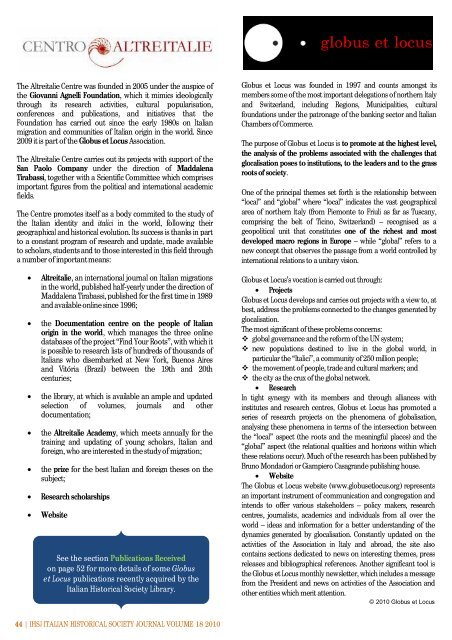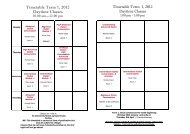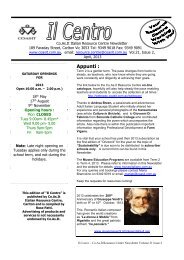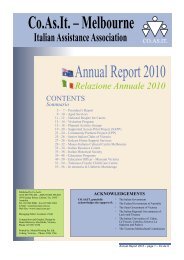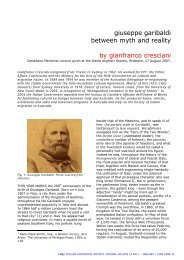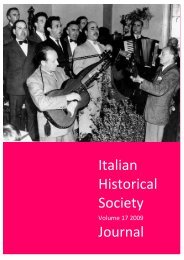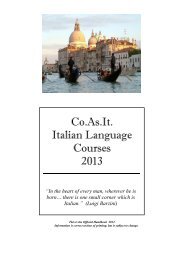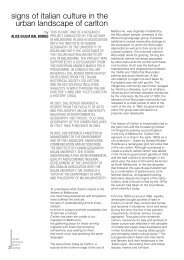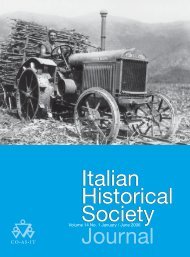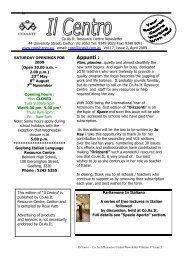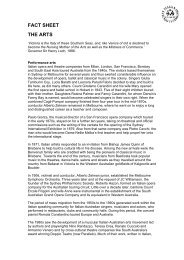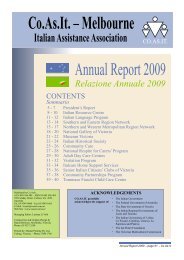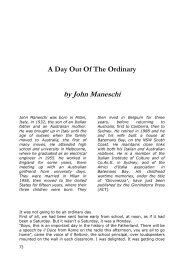January-December 2010, vol. 1
January-December 2010, vol. 1
January-December 2010, vol. 1
- No tags were found...
Create successful ePaper yourself
Turn your PDF publications into a flip-book with our unique Google optimized e-Paper software.
The Altreitalie Centre was founded in 2005 under the auspice ofthe Giovanni Agnelli Foundation, which it mimics ideologicallythrough its research activities, cultural popularisation,conferences and publications, and initiatives that theFoundation has carried out since the early 1980s on Italianmigration and communities of Italian origin in the world. Since2009 it is part of the Globus et Locus Association.The Altreitalie Centre carries out its projects with support of theSan Paolo Company under the direction of MaddalenaTirabassi, together with a Scientific Committee which comprisesimportant figures from the political and international academicfields.The Centre promotes itself as a body commited to the study ofthe Italian identity and italici in the world, following theirgeographical and historical e<strong>vol</strong>ution. Its success is thanks in partto a constant program of research and update, made availableto scholars, students and to those interested in this field througha number of important means:• Altreitalie, an international journal on Italian migrationsin the world, published half-yearly under the direction ofMaddalena Tirabassi, published for the first time in 1989and available online since 1996;• the Documentation centre on the people of Italianorigin in the world, which manages the three onlinedatabases of the project “Find Your Roots”, with which itis possible to research lists of hundreds of thousands ofItalians who disembarked at New York, Buenos Airesand Vitória (Brazil) between the 19th and 20thcenturies;• the library, at which is available an ample and updatedselection of <strong>vol</strong>umes, journals and otherdocumentation;• the Altreitalie Academy, which meets annually for thetraining and updating of young scholars, Italian andforeign, who are interested in the study of migration;• the prize for the best Italian and foreign theses on thesubject;• Research scholarships• WebsiteSee the section Publications Receivedon page 52 for more details of some Globuset Locus publications recently acquired by theItalian Historical Society Library.Globus et Locus was founded in 1997 and counts amongst itsmembers some of the most important delegations of northern Italyand Switzerland, including Regions, Municipalities, culturalfoundations under the patronage of the banking sector and ItalianChambers of Commerce.The purpose of Globus et Locus is to promote at the highest level,the analysis of the problems associated with the challenges thatglocalisation poses to institutions, to the leaders and to the grassroots of society.One of the principal themes set forth is the relationship between“local” and “global” where “local” indicates the vast geographicalarea of northern Italy (from Piemonte to Friuli as far as Tuscany,comprising the belt of Ticino, Switzerland) – recognised as ageopolitical unit that constitutes one of the richest and mostdeveloped macro regions in Europe – while “global” refers to anew concept that observes the passage from a world controlled byinternational relations to a unitary vision.Globus et Locus’s vocation is carried out through:• ProjectsGlobus et Locus develops and carries out projects with a view to, atbest, address the problems connected to the changes generated byglocalisation.The most significant of these problems concerns: global governance and the reform of the UN system; new populations destined to live in the global world, inparticular the “Italici”, a community of 250 million people; the movement of people, trade and cultural markers; and the city as the crux of the global network.• ResearchIn tight synergy with its members and through alliances withinstitutes and research centres, Globus et Locus has promoted aseries of research projects on the phenomena of globalisation,analysing these phenomena in terms of the intersection betweenthe “local” aspect (the roots and the meaningful places) and the“global” aspect (the relational qualities and horizons within whichthese relations occur). Much of the research has been published byBruno Mondadori or Giampiero Casagrande publishing house.• WebsiteThe Globus et Locus website (www.globusetlocus.org) representsan important instrument of communication and congregation andintends to offer various stakeholders – policy makers, researchcentres, journalists, academics and individuals from all over theworld – ideas and information for a better understanding of thedynamics generated by glocalisation. Constantly updated on theactivities of the Association in Italy and abroad, the site alsocontains sections dedicated to news on interesting themes, pressreleases and bibliographical references. Another significant tool isthe Globus et Locus monthly newsletter, which includes a messagefrom the President and news on activities of the Association andother entities which merit attention.© <strong>2010</strong> Globus et Locus44 | IHSJ ITALIAN HISTORICAL SOCIETY JOURNAL VOLUME 18 <strong>2010</strong>


